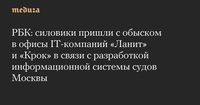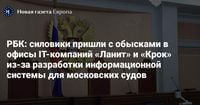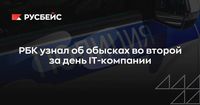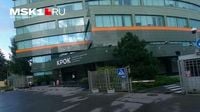On Thursday, March 20, 2025, law enforcement officials, including the FSB, conducted searches at the offices of two major Russian IT firms, Lanit and Krok, in Moscow. These actions are part of an investigation into the development of a Complex Information System of Courts of General Jurisdiction of Moscow (KIS SOU), which both companies participated in.
According to reports from RBC, the FSB seized documents linked to the KIS SOU project during their searches at Lanit, which is one of the largest players in the Russian IT market, and Krok, a significant partner in developing the court's information system. The investigations are focused on the legality of funding allocated for the development of KIS SOU, with no criminal case having been opened against either company at this time.
Sources involved in the industry revealed that this investigation follows a series of operational failures in KIS SOU that occurred in the summer and autumn of 2024. A Telegram channel reported the first incident in August, while a second major failure was noted in early October, which the Supreme Court labeled an 'information security incident.' The Ukrainian hacker group BO Team claimed responsibility for the second disruption. The outages resulted in significant operational challenges, with users of the Moscow City Court's systems facing interruptions and a lack of service.
Krok's press service affirmed that the company continues to operate normally, stating, "All business processes, including customer support, function within the established regulations and are carried out without interruptions." Meanwhile, both companies emphasize their commitment to carrying out work in line with contractual obligations and maintaining communication with clients.
Interestingly, the KIS SOU is part of a broader electronic justice system, integrated into the GAS 'Justice' system, which has faced scrutiny in light of recent hacking incidents. Following these attacks, it was determined that hundreds of domestically produced servers and a dedicated cybersecurity department would be established to enhance security measures moving forward.
Founded in 1993, Lanit has positioned itself as a key player in the field of digitalization and import substitution within Russia, engaging in software development tailored to the needs of various sectors including postal services, public administration, and cultural heritage. Similarly, Krok, established in 1992, has made its mark by providing consulting and software customization across diverse industries, maintaining partnerships with over 400 clients, harking back to its involvement with major firms such as Norilsk Nickel and various state-owned organizations.
The recent actions by Russian authorities spark growing concerns within the technology sector, particularly as both firms had previously been subject to scrutiny from the US government, with Lanit being placed under sanctions in May 2024, alongside other notable IT corporations.
As the investigation unfolds, the future of both companies could hinge on the outcomes of the checks conducted by law enforcement. With the FSB actively looking into potential misuse of public funds, many are questioning the implications this may have for Russian IT firms' reliance on government contracts and how this scrutiny might impact their operations moving forward.
The nature of these inspections highlights the ongoing pressure faced by technology firms in Russia amid an atmosphere both of increasing regulatory oversight and cybersecurity challenges. Experts note that firms must prepare for more rigorous audits and recalibrate their operational strategies accordingly.
Overall, these events signify the intersection of law enforcement and the IT sector within Russia, shedding light on the complexities organizations face while navigating regulatory frameworks while also striving toward technological advancements.
Given the importance of these companies within the Russian market, the outcomes of these checks will be closely watched by industry stakeholders, competitors, and consumers alike.






